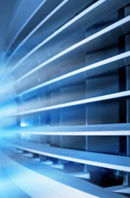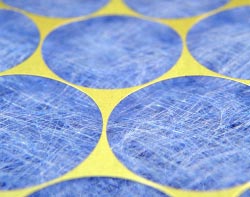|
|
||||||
| Air Conditioning Filters How often should your air conditioning filter be changed or cleaned? Home air filters have a life span of approximately one to two months, depending on your rate of usage. Air filters used in an office usually need to be changed more often, as do air filters located in homes with pets, or located in a dusty climate. Dust and debris are an indication that allergens and pollutants are present, and your air conditioner filter is functioning at reduced levels. In fact, air conditioning repair services often begin with a filter check; dirty filters are the source of many poorly functioning air conditioner systems. Air filters must be matched in size to your air conditioner unit; a filter that is too small will do a poor job of capturing dust particles, while a filter that is too large can block your system's flow of air. When installing a filter, pay special attention to your conditioning system's return ducts , which must be sealed properly in order to prevent dirty air from leaking into your air conditioning equipment . Contact your local air conditioning company if you need ductwork cleaned or repaired. In order to ensure the efficient operation of your air conditioning in Tampa or Los Angeles, it is necessary to select the best air conditioning filter for your needs. There are three different kinds of filtration systems available on today's market, classified according to their material and operation. Mechanical air filters are commonly used in home air conditioning units, in addition to small industrial air conditioners and commercial air conditioning system . These filters use mechanical means, such as synthetic fibers, to trap dust and debris before they pollute the circulated air. Charcoal filters , which help control odors such as those emitted by pets, would also fall into this category.
Electronic air filters are more expensive than mechanical filters, but are usually more efficient. Because they use electricity to attract molecules, electronic air filters have the ability to trap finer particles, in addition to pet, cooking, smoke, or mold odors.
When your air conditioning filters need to
be changed, you must select the replacement air filters that
best suits your needs and budget. Generally speaking, filters
designated as HEPA (High Efficiency Particulate
Arresting) will trap the most dust and debris, up to 99.7% of
airborne molecules. HEPA filters are available
in all of the different filter types listed above; please consult
your air conditioner unit 's manual
for brand recommendations, such as Honeywell air filters .
During your home's air conditioning installation ,
ask your technician to write down his or her recommendation for
the appropriate air filters for your air conditioning unit. Your local air conditioning
contractor can also direct you to an air conditioning supplystore that will fulfill all your filter needs. |
| FAQs Resources Sitemap Contact Us Directory All Rights Reserved © Copyright 2007 Air-Conditioning-Filters.com |



